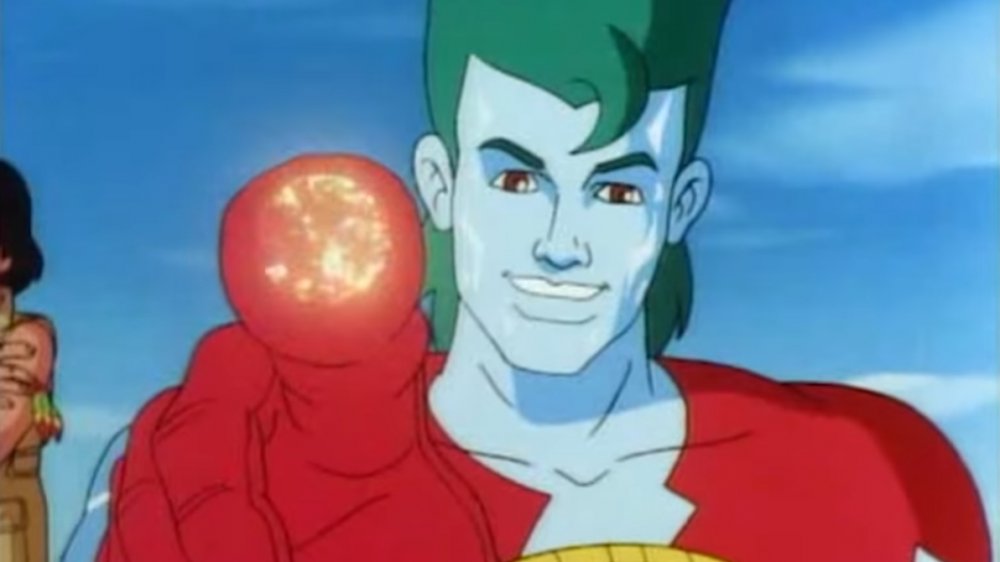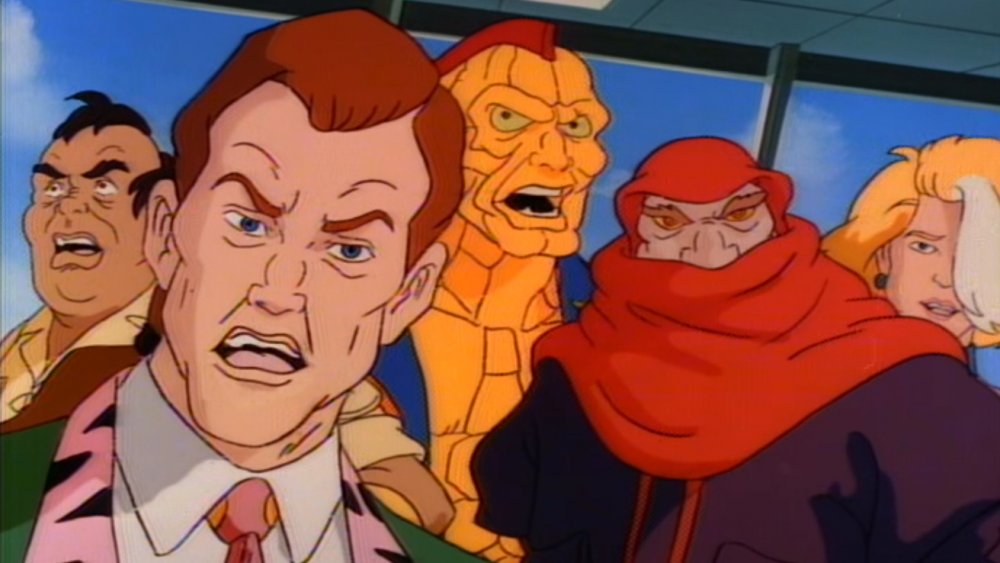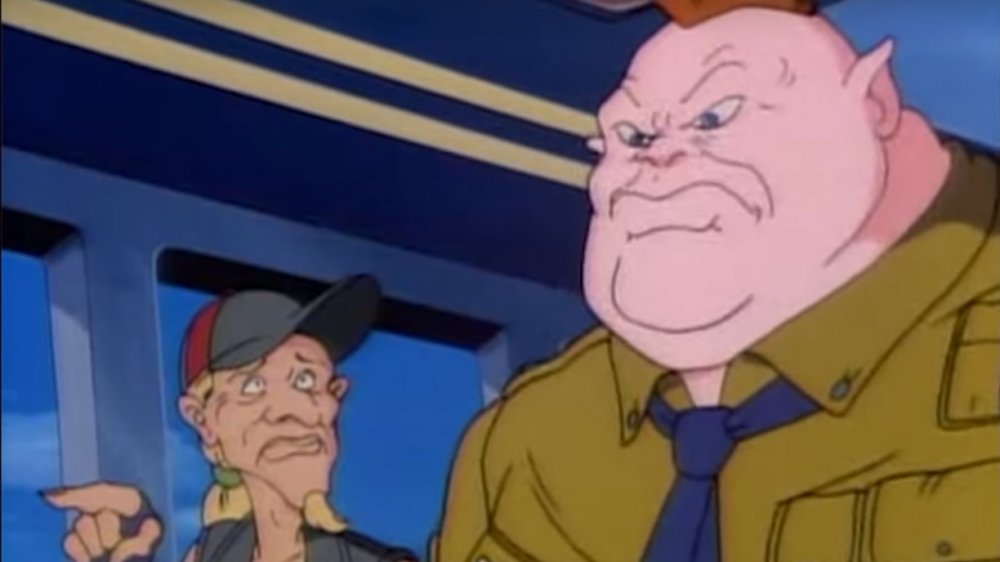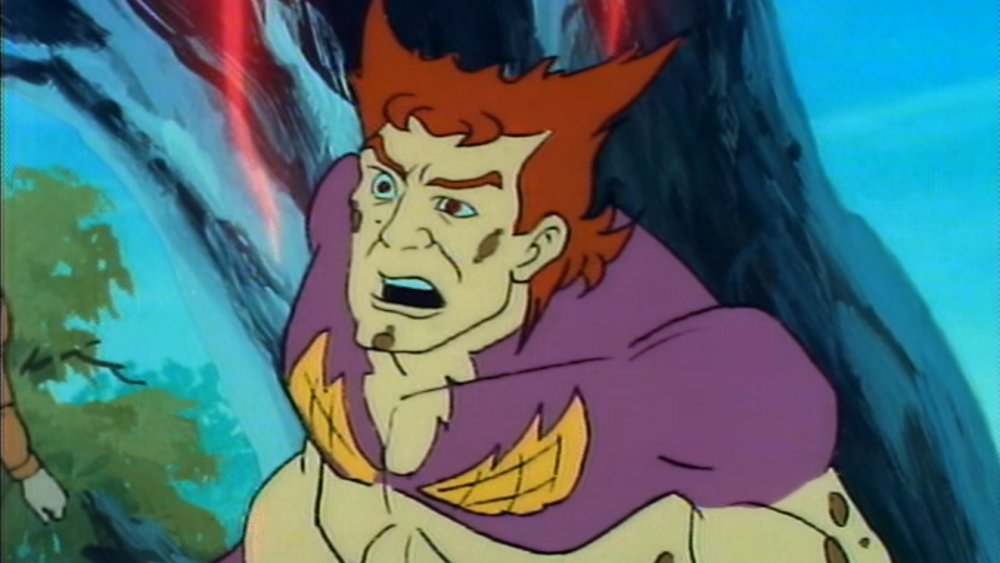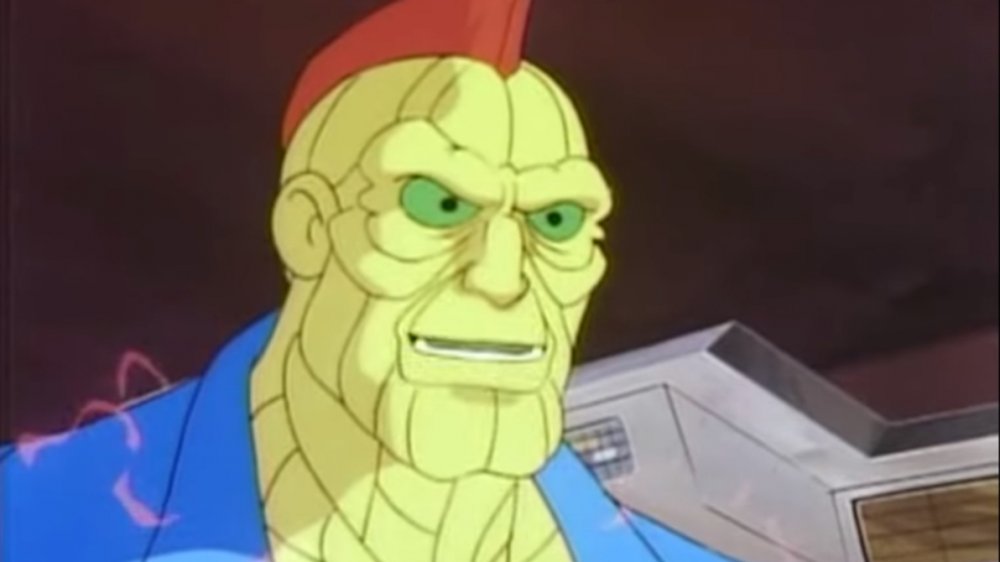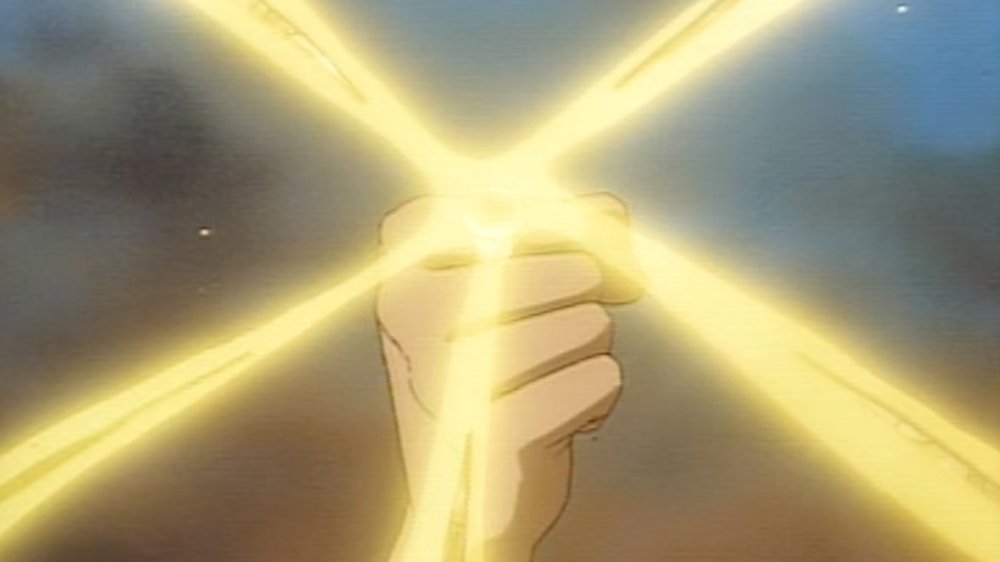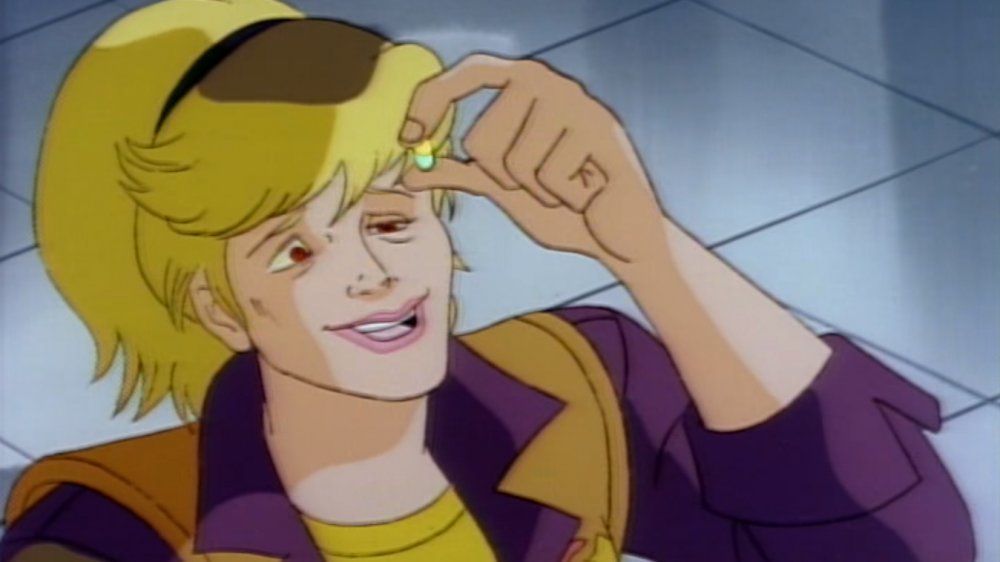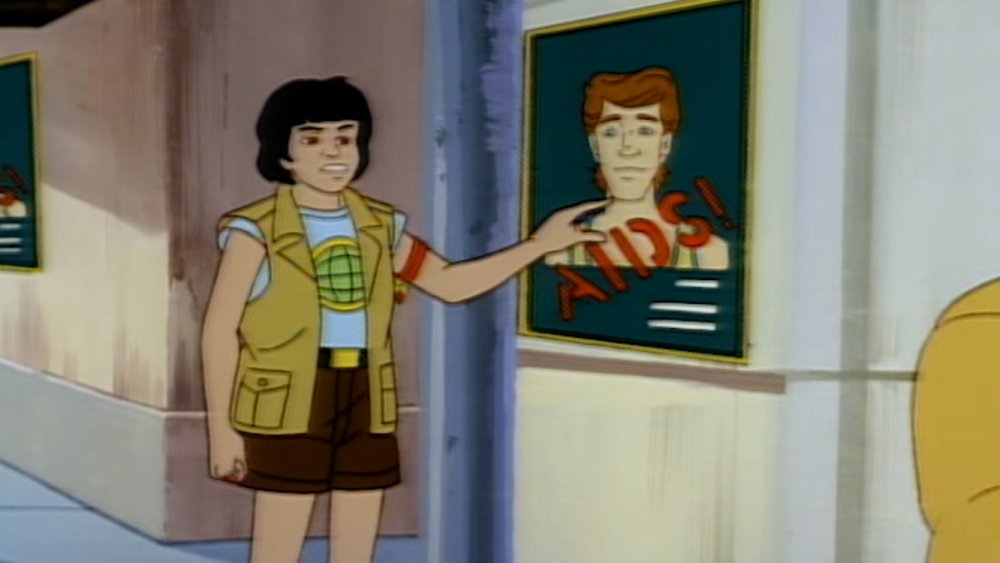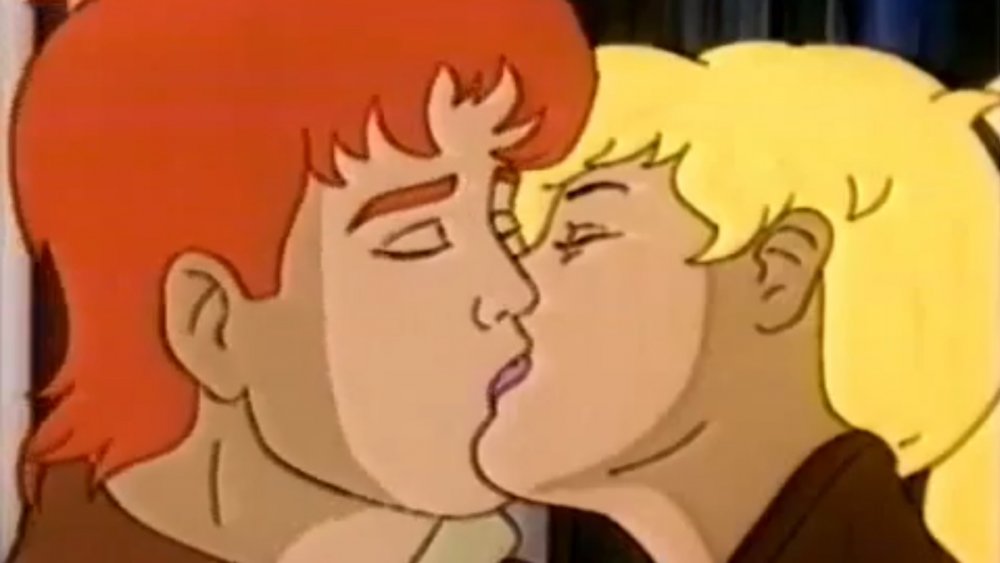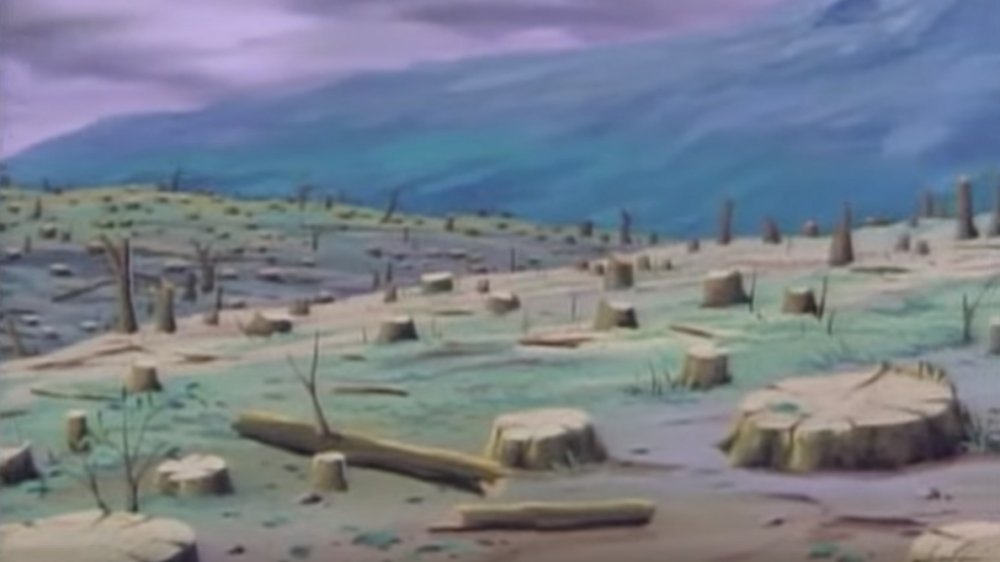Things Only Adults Notice In Captain Planet
Captain Planet and the Planeteers may have been created as one of the most transparent pieces of edutainment ever, but the show itself ended up being so good — and the messages it contained were so important — that it was a genuine mainstream hit. He may not have been able to truly "take pollution down to zero" quite like he promised, but Captain Planet did inspire a generation of kids to care for the environment. His legacy continues to this day, most notably in the Captain Planet Foundation, which helps spread education about environmental issues and grants seed money to young people working on environmental projects.
Now that all of the little Planeteers who grew up watching Captain Planet's exploits have grown up and started getting arrested at protests in Captain Planet costumes, it feels like the right time for a look back at the show itself. After rewatching it through the jaded eyes of adulthood, we're here to bring you all the strange hanging plot threads, surprising facts, and head-scratching moments that we completely breezed past as children. Some of it is painfully dated, but some of it is so prescient that, almost three decades later, it still feels like it's coming from the future. Here's all the surprising things that only adults notice in Captain Planet.
The cast of Captain Planet is bafflingly star-studded
When you rewatch Captain Planet as an adult, you'll be startled how many times you'll find yourself saying, "I know that voice!" That's because many of the biggest stars of the early '90s lent their voices to this animated series. What makes this even more delightful is that most of the star power was concentrated in the villains, so these normally respectable actors really get a chance to have some fun as they portray the delightfully hammy Eco-Villains that oppose the Planeteers.
Meg Ryan played the megalomaniacal scientist Dr. Blight, and her talking computer MAL was played by Tim Curry during most of his appearances. The oil baron Hoggish Greedly and his sidekick Rigger were played by Ed Asner and John Ratzenberger, respectively. Martin Sheen played the Sly Sludge, James Coburn played Looten Plunder, and the evil rat mutant Verminous Skumm was played by Jeff Goldblum. Perhaps strangest of all, the evil spirit Zarm was played by the rock star Sting, in one of his very few forays into acting as someone other than himself.
There are fewer household names among the ranks of the heroes, as most of the Planeteers' were played by veteran voice actors, rather than live-action A-listers, but there were two notable bits of stunt casting among the good guys. The team's mentor, Gaia, the spirit of the Earth, was played by Whoopi Goldberg; and Kwame, the wielder of the Earth ring, was played by LeVar Burton.
Most of the villains' plans make zero sense
In the first episode of Captain Planet, we meet the villainous Hoggish Greedly, an amoral oil baron who starts illegally drilling in a wildlife sanctuary, unconcerned with the massive damage his operation is doing to the local wildlife. It's a surprisingly realistic motivation for an antagonist that's nonetheless clearly evil, and it makes Greedly an easily understandable villain for a young audience. Everybody likes baby seals!
However, in most subsequent episodes, far less work is put into coming up with three-dimensional villains whose plans can survive even the most cursory of examinations. Oftentimes, the villains seem to be polluting for its own sake, without actually gaining anything from it. For instance, in the episode "Deadly Ransom," Dr. Blight states, in no uncertain terms, that her ultimate goal is to "destroy the Earth."
Some villains do better than others in this regard. Looten Plunder, for instance, is always clearly motivated by money. The most consistently nonsensical villain of the bunch is definitely Verminous Skumm, who wants to spread disease, cause acid rain, and transform everyone in the world into mutant rats like himself. Y'know, just cuz. That's all well and good if you're just making a dumb kids cartoon, but Captain Planet is ostensibly trying to teach kids about environmentalism. It's not exactly clear what real world evils Verminous Skumm is supposed to represent.
Captain Pollution is surprisingly non-threatening
Towards the end of the first season, Dr. Blight reveals her newest invention: the nebulously defined "Molecular Duplicator," which can create the "evil opposite" of any object placed within it. Teaming up with four other recurring evil-doers, Blight steals the Planeteers' five magic rings and uses her Duplicator to create five evil ones. Instead of having the powers of Earth, Fire, Wind, Water, and Heart, the evil rings have the powers of Deforestation, Super Radiation (whatever that is), Smog, Toxins, and Hate. Additionally, just like the Planeteer's have the ability to summon Captain Planet, Blight's team can summon the ostensibly terrifying Captain Pollution.
In practice, Captain Pollution is a complete joke, due to a potentially unforeseen flaw in his conception. You see, Captain Planet's powers are derived from the natural world, so sunlight and clean water can heal him, whereas pollutants incapacitate him. Captain Pollution, being Captain Planet's opposite, gets his powers from bathing in pollutants and is harmed by direct contact with nature. This all sounds well and good, until you realize that dirt, air, water, and sunlight are (thankfully) WAY more plentiful than uranium, smog, and oil spills.
Although the series continually tries to sell him as a genuine threat, Captain Pollution always requires a great deal of plot contrivance in order to actually threaten anyone. For instance, in his first battle against the Planeteers, our heroes swiftly defeat him by spraying him with a hose.
Wait, there was a villain named Duke Nukem?
If you were around during the '90s, and you're even tangentially interested in video games, then when you hear the name "Duke Nukem," you probably picture a blonde flat top, muscles, and sunglasses. For that reason, it might surprise you when you're watching Captain Planet, and you come across a radiation-themed Eco-Villain who, strangely enough, has the exact same name.
However, not only does this rock man with a mohawk and a Hawaiian shirt not have anything to do with the gun-toting video game protagonist, the first appearance of Captain Planet's Duke Nukem actually pre-dates the release of the first Duke Nukem video game by about a year. (The Captain Planet one is also apparently a doctor, sometimes referred to him as "Doctor Duke Nukem," but what exactly he is a doctor of is never explored further.)
It seems like this was probably just an extremely unlikely coincidence, as it would be a pretty brazen move to name your video game character after an already established cartoon character that you don't own the rights to. But surprisingly, when the developers of the video game series Duke Nukem discovered the coincidence, they didn't back down from the fight. Although they briefly changed the spelling of their character's name to "Duke Nukum," once they discovered that the creators of Captain Planet hadn't actually copyrighted the name "Duke Nukem," they swept in and claimed the copyright for themselves, and then changed the spelling back.
The power of Heart is scary
Let's face it, when you played Captain Planet with your friends as kids, nobody wanted to be Ma-Ti. Gi summons tsunamis. Wheeler is a human flamethrower. Ma-Ti can ... talk to animals? To a child, Ma-Ti's ill-defined power of Heart definitely seems like the weakest of the five. However, rewatching through adult eyes, you realize that Ma-Ti might actually have the scariest superpower of all: mind control.
In "Two Futures," Wheeler travels to a dark alternate timeline in which the Planeteers fail to stop humanity from destroying the environment. In this reality, the rainforests have been destroyed, most animals are extinct, and New York City is underwater. Ma-Ti has also fallen on hard times, becoming a homeless beggar. And interestingly, this version of Ma-Ti uses his powers in a way that we've never seen present day Ma-Ti use them before: convincing rich people to donate to poor people like himself. This is still clearly a fairly benign use of his powers, but it opens up a whole can of worms about just what the limits of Ma-Ti's powers actually are.
Let's just put it this way: if we ever get that gritty Captain Planet reboot that absolutely no one is asking for, we could see a world in which the littlest Planeteer goes dark, a mind-controlling supervillain in the vein of Kilgrave from Jessica Jones. Good thing Ma-Ti is such a pure cinnamon roll of a human being and we never have to learn the answers to these kinds of questions.
It handled most real-world issues badly
There's nothing wrong with telling a story that has a message. In fact, time and again, we find evidence that fiction is actually capable of changing the world. But in the case of Captain Planet, every once in a while, all it has is message, and it delivers that message extremely bluntly. Pretty much every episode of Captain Planet aspires to be a "very special episode" of one sort or another, but whenever the series steps outside its normal thematic space of environmentalism, it pretty much always falls flat on its face.
One such cringe-worthy episode was "If it's Doomsday This Must be Belfast," which, over the course of a single 22-minute episode, attempted to address the Protestant/Catholic conflict in Ireland, the Israeli/Palestinian conflict in the Middle East, AND apartheid in South Africa. You can guess about how much room that episode left for subtlety.
Another disastrously ill-conceived episode with a message was "Mind Pollution," an episode about drugs that is, without a doubt, the darkest episode of the series. Both Linka and her cousin Boris get addicted to a fictional drug called Bliss, which can transform a person into a mindless zombie after just a single dose. The episode ends with Boris dying from a drug overdose, the only on-screen death in the history of the series. That being said, everything about the episode is so bafflingly nonsensical that it often reaches Reefer Madness levels of unintentional comedy.
It handled AIDS surprisingly well
Most of Captain Planet's episodes that try to address real-world problems are complete dumpster fires. That's why it's so surprising that the episode "A Formula for Hate," which sought to educate its viewers about the AIDS crisis, handled its portrayal of the disease pretty much perfectly.
The episode centers on a high school student named Todd Andrews (played by a teenage Neil Patrick Harris) who discovers that he has contracted HIV from a blood transfusion. Then, Verminous Skumm starts spreading rumors throughout Todd's school that Todd's disease is highly contagious. (As usual, we don't get much motivation for why Skumm is deciding to ruin this kid's life. Presumably just for kicks.) Todd gets ostracized from his school, and his mother's business gets destroyed by an angry mob. In the end, Captain Planet and the Planeteers show up and help teach the students to separate fact from fiction, teaching them that many harmful myths about HIV are completely false.
It wasn't necessarily a great episode of television for entertainment purposes, but in terms of its educational content, it was shockingly well-researched and accurate. The episode ends with a quote from Gaia, who says, "AIDS is a terrible epidemic plaguing our world, but two things make it even worse: ignorance and fear. You cannot catch AIDS from hugging or playing or eating in the same cafeteria with someone. Learn the facts about AIDS. Talk to your parents, your school nurse, counselor, or your teacher.
Not bad for 1992.
Only the white people were allowed to kiss
For all its supposed progressiveness, every once in a while Captain Planet ends up being weirdly regressive, especially in terms of how the series portrays romance. This is to say that, even though three of the five Planeteers are nonwhite (Kwame, Gi, and Ma-Ti), only the two white Planeteers (Wheeler and Linka) are ever shown in romantic relationships. Typically they are paired up with one another, but sometimes Wheeler is also allowed a brief fling with a guest star (such as Trish in the episode "Talkin' Trash" or Bambi in "Hollywaste"). However, Linka is never allowed similar dalliances, and Wheeler's little flings are always with white women.
It's strange that a show that is committed to many other forms of progressiveness has a blind spot like this. There's obviously nothing wrong with a character who is uninterested in romance, but when three out of three non-white Planeteers are consistently left out of romantic subplots, it hints that maybe the creators weren't prioritizing giving these characters as rich of an inner life as their white counterparts.
To be fair, the one romantic relationship we did get wasn't all that great either. Despite Linka constantly rebuffing Wheeler's advances, Wheeler continued to aggressively hit on her all throughout the series, a dynamic that was played largely for comedy, as opposed to the sexual harrassment that it actually was. Shame that, for all the lessons that Captain Planet taught Wheeler, he apparently never got around to teaching the boy about consent.
It didn't work
Perhaps the most surprising thing that you'll feel when you rewatch Captain Planet as an adult is a profound sense of sadness. Despite all the warnings it gave us about issues like deforestation, extinction, and climate change, we still haven't really solved any of these issues.
Captain Planet and the Planeteers is often extremely optimistic in terms of how simple it is to solve the problems that threaten our world. On one hand, it can be refreshing, in our increasingly complicated and cynical age, to personify all the world's environmental issues as a single cackling villain, and then watch a flying blue man with a mullet punch that villain in the face. On the other hand, given how impossible it seems for the world to muster up the willpower to solve even the most basic of problems, it's also completely understandable that this simplistic outlook might strike you now as hopelessly naive, to the point of being useless.
But despite how ham-fisted it could get, nowadays our world could stand to have more cartoons like this one. Captain Planet and the Planeteers was undeniably brave, and decades later, it's generally landed on the right side of history. That being said, rewatching the series with adult eyes, it's difficult to not always feel at least a little tinge of bittersweetness. It just goes to show that once you grow up, you can't really go back to seeing anything from your childhood how you did before.
